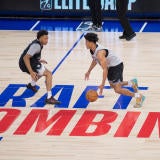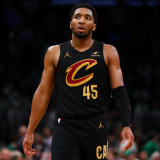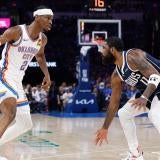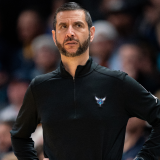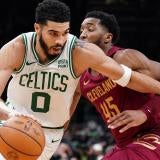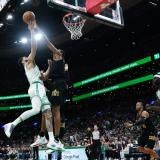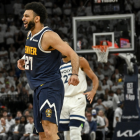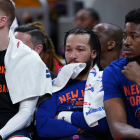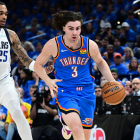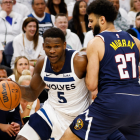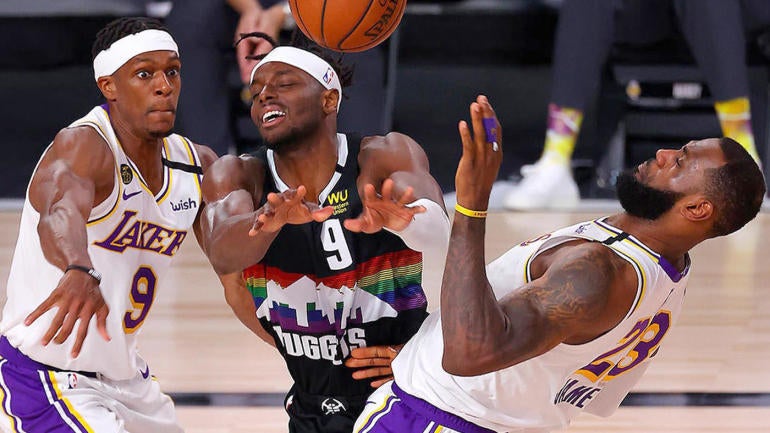
The Los Angeles Lakers nearly out-Nuggeted the Denver Nuggets in Tuesday's Game 3 of the Western Conference finals, whittling a 20-point fourth-quarter deficit down to three in fewer than five minutes of game time. It was astonishing to watch, and was eerily reminiscent of the Los Angeles Clippers collapses that Denver initiated last series. The difference, however, was that Jamal Murray came to the rescue, thwarting the Lakers to come away with a 114-106 win to cut the Lakers' series lead to 2-1.
One of the main reasons the Lakers were able to mount their comeback so quickly was coach Frank Vogel employing a rare zone defense, which clearly confounded the Nuggets' offense. From the 8:43 mark to the 6:34 mark of the fourth quarter, Denver committed six consecutive turnovers, three of which were steals from Rajon Rondo, as the Lakers cut the lead to three:
Watching the Nuggets come within inches of self destruction while facing the zone defense leads to an obvious question: Why don't the Lakers play zone more often? We've seen it work in other series this postseason, namely the Toronto Raptors and Miami Heat against the Boston Celtics, so why wouldn't the Lakers make it a main part of their defensive game plan moving forward against the Nuggets? Against a pick-and-roll duo as devastating as Murray and Nikola Jokic, a zone can eliminate the mismatches and scrambling that often lead to easy looks.
Vogel addressed the idea of playing more zone on Wednesday, and he made it clear that he doesn't think it's something the Lakers can rely on for long periods of time.
"We just threw a junk defense out there. I don't know if that's something that's really sustainable," Vogel said. "A lot of times when a team has a big lead you can just kind of make a run at it by throwing a junk defense. It worked in a short burst there. But we've just got to be better with who we are, with our base defense, base coverages, and executing offensively better."
During the regular season, the Lakers played zone on two percent of their defensive possessions, according to Synergy Sports Technology, good for 12th in the league (the Heat led the NBA, by far, at 11.6 percent). In the playoffs, the Lakers have played zone 1.9 percent of the time, and Vogel explained why.
"Most zones in the NBA are not very good; there's a lot of holes in them and can be easily exploited," Vogel said. "It doesn't always happen, but that's why most of the league does not play zone for long stretches."
For most NBA teams, the zone acts like a changeup in baseball. It can be incredibly effective every once in a while to offset the fastball, but if you throw nothing but changeups the element of surprise is removed, and it becomes easier to hit. Add this to the fact that the Nuggets were the best offensive team in the NBA against zone defense during the regular season at 1.213 points per possession, according to Synergy, and it makes sense that Vogel would want to use it sparingly against a team that passes and cuts as well as Denver.
"I would say it was unexpected, forced us into a lot of turnovers early. I just think we were shocked by it, thrown off guard by it," Nuggets forward Torrey Craig said Wednesday of the Lakers' zone defense. "We were rattled a little bit, but we settled down. Once we settled down and seen some shots go in, we were fine."
With the "shock" factor of the Lakers' zone now off the table, you shouldn't expect to see much of it, if any, in Thursday's Game 4 despite its effectiveness at the end of Game 3. Another point to consider: Vogel said he only considered using the zone because they were down by so many points, which doesn't happen to the Lakers very often.
"The junk defense is typically not as good as your base defense," Vogel said. "And if you're winning with your base defense, why would you go with a defense that's not as good as what you're using?"







